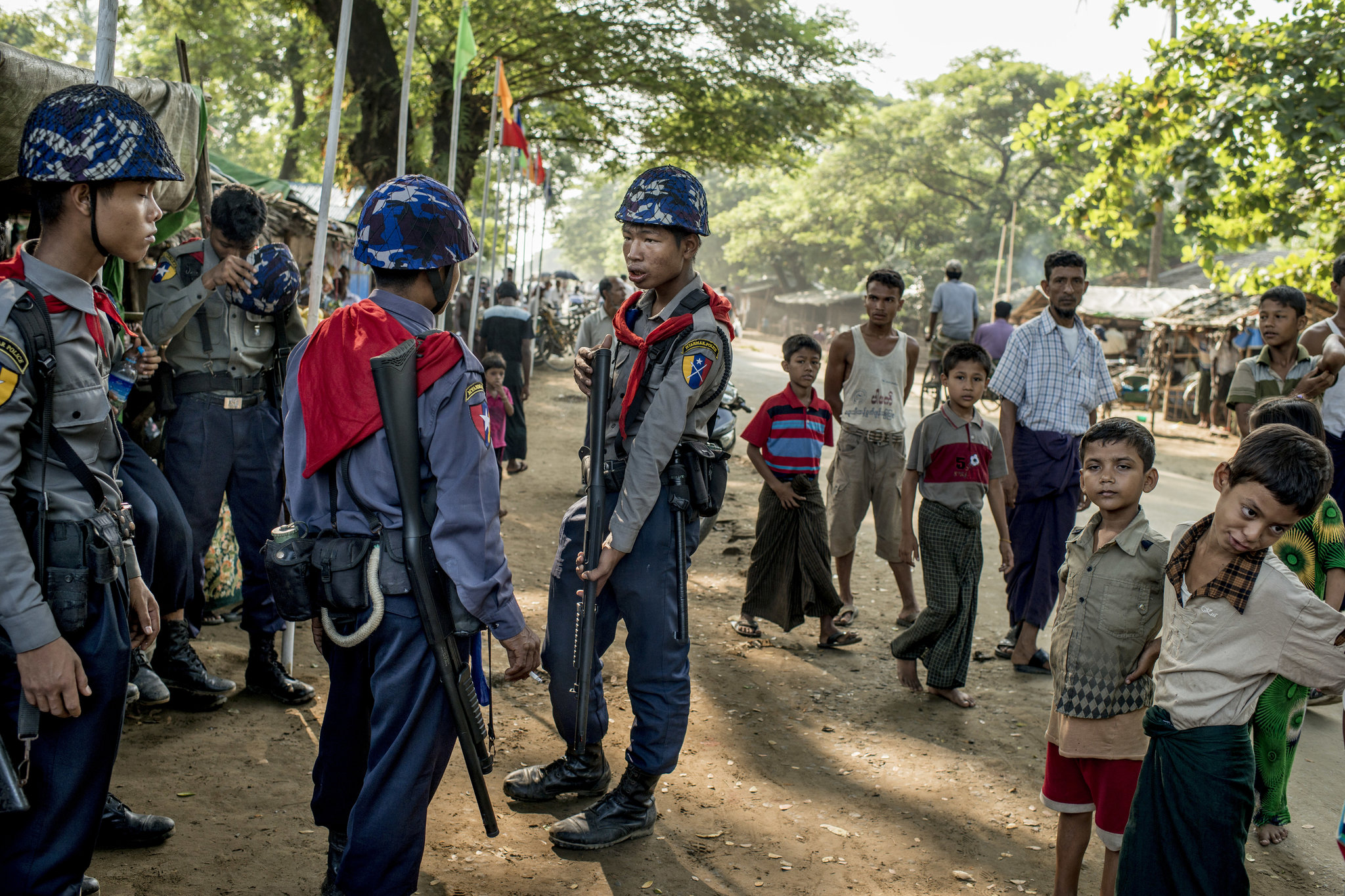Britain And Australia's Myanmar Policy: Selective Sanctions And The Untouched Opposition

Table of Contents
The Limitations of Selective Sanctions in Myanmar
Targeting Specific Individuals and Entities
Effectively targeting key players within the Myanmar military junta (Tatmadaw) through sanctions remains a significant challenge. Asset freezes and travel bans, while symbolic, often prove ineffective due to the junta's sophisticated networks for hiding assets and evading international scrutiny. Sanctions imposed on specific individuals like Min Aung Hlaing, the head of the Tatmadaw, and certain military-owned conglomerates like the Myanmar Economic Corporation (MEC), have had limited impact.
- Examples of sanctions: Both Britain and Australia have imposed asset freezes and travel bans on senior military officials and entities linked to human rights abuses. However, the impact has been minimal due to the ability of the regime to move assets and utilize proxy networks.
- Loopholes exploited: The junta has effectively utilized shell companies and offshore accounts to circumvent the imposed sanctions, making it challenging to track and freeze assets effectively.
- Successes and Failures: While some assets have been frozen, the overall impact on the junta's financial capacity has been significantly less than intended. This highlights the need for more robust and collaborative international efforts.
The Economic Impact and Unintended Consequences
Sanctions, while intended to pressure the regime, often have detrimental unintended consequences on the civilian population. The Myanmar economy, already fragile, has suffered further due to reduced foreign investment and trade disruptions. Sectors like jade mining and tourism, vital for the country's economy, have been severely impacted.
- Negative economic impacts: The sanctions have resulted in job losses, increased poverty, and a decline in access to essential goods and services for ordinary citizens. This undermines the legitimacy and effectiveness of the sanctions themselves.
- Impact on specific sectors: The jade mining industry, a significant source of revenue for the junta, has seen a decline, but this hasn't significantly weakened the regime. Tourism, crucial for many livelihoods, has almost entirely collapsed, impacting countless families.
- Harming ordinary citizens: The unintended consequences of sanctions highlight the ethical dilemma of imposing economic pressure while potentially exacerbating the suffering of those the sanctions aim to protect.
The Untouched Opposition and the Need for Broader Engagement
Diverse Opposition Groups and their Varying Goals
The opposition to the military junta is far from monolithic. Key players include the National Unity Government (NUG), a shadow government claiming legitimacy, and various ethnic armed organizations (EAOs) fighting for greater autonomy. These groups have differing goals and strategies, often resulting in internal conflicts and divisions that complicate international engagement.
- Profiles of key opposition groups: The NUG seeks to restore democracy through political means, while EAOs primarily focus on securing greater autonomy for their respective ethnic groups. Their divergent objectives limit the potential for unified action against the junta.
- Internal conflicts and divisions: Competition for resources and influence among EAOs, and differing approaches between the NUG and some EAOs, hinder a cohesive anti-junta movement.
The Need for a More Inclusive Approach
A more comprehensive strategy is needed, engaging with a wider range of opposition groups rather than solely focusing on the NUG or specific EAOs. This demands improved coordination among international actors, fostering a collaborative effort to support a broader spectrum of opposition groups.
- Limitations of focusing on the NUG: While the NUG represents a significant part of the opposition, excluding other groups weakens the overall resistance to the junta.
- Suggestions for a more inclusive strategy: Increased diplomatic efforts, providing humanitarian aid and supporting civil society groups across the diverse opposition landscape, are crucial for an effective response.
Comparing Britain and Australia's Approaches to Myanmar
Similarities and Differences in their Sanctions Regimes
Both Britain and Australia have imposed targeted sanctions, including asset freezes and travel bans, on individuals and entities linked to the Tatmadaw. However, the scope and specifics of these sanctions differ slightly, with varying levels of engagement with different opposition groups. Coordination between their diplomatic efforts appears limited.
- Comparison table: (A table would be inserted here comparing the specific sanctions, targets, and diplomatic efforts of Britain and Australia.)
Effectiveness of Diplomatic Engagement
Both countries have engaged in diplomatic initiatives, but their effectiveness in influencing the Myanmar situation remains questionable. Their statements and actions have had limited impact on the junta's behavior. International organizations like the UN have played a significant role in shaping international policy, but their ability to influence the situation on the ground remains limited.
- Examples of diplomatic initiatives: Joint statements condemning human rights abuses, participation in UN Security Council resolutions, and individual diplomatic efforts have had mixed results, highlighting the need for a more comprehensive strategy.
Re-evaluating Britain and Australia's Myanmar Policy
In conclusion, this analysis reveals significant limitations in Britain and Australia's Myanmar policy. Selective sanctions, while a necessary tool, have proven insufficient due to challenges in targeting and unintended consequences. The lack of inclusive engagement with diverse opposition groups undermines the effectiveness of their overall strategy. Both countries need a more comprehensive approach, integrating targeted sanctions with robust diplomatic efforts, and engaging with a broader spectrum of opposition actors.
The urgent need for a more effective Britain and Australia's Myanmar policy cannot be overstated. This requires:
- Increased funding for humanitarian aid to support the displaced and vulnerable populations.
- Stronger support for civil society groups and independent media outlets to counter state propaganda.
- Increased diplomatic pressure on the junta, focusing on accountability for human rights violations and the restoration of democracy.
- Improved coordination between Britain, Australia, and other international actors.
We urge both governments, international organizations, and individuals to actively support these actions to bring about a just and peaceful resolution to the crisis in Myanmar. The future of the nation hinges on a fundamentally reformed Britain and Australia's Myanmar policy.

Featured Posts
-
 Sabalenka Uses Photo Evidence To Dispute Umpire Call At Stuttgart Open
May 13, 2025
Sabalenka Uses Photo Evidence To Dispute Umpire Call At Stuttgart Open
May 13, 2025 -
 Sabalenka Defeats Paolini Sets Up Porsche Grand Prix Final With Ostapenko
May 13, 2025
Sabalenka Defeats Paolini Sets Up Porsche Grand Prix Final With Ostapenko
May 13, 2025 -
 Experience Greece In Portola Valley A New Taverna Opens Its Doors
May 13, 2025
Experience Greece In Portola Valley A New Taverna Opens Its Doors
May 13, 2025 -
 Senior Travel And Activities Calendar
May 13, 2025
Senior Travel And Activities Calendar
May 13, 2025 -
 Moskva Ploschadka Dlya Rossiysko Myanmanskogo Delovogo Foruma
May 13, 2025
Moskva Ploschadka Dlya Rossiysko Myanmanskogo Delovogo Foruma
May 13, 2025
